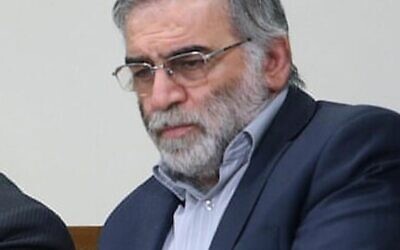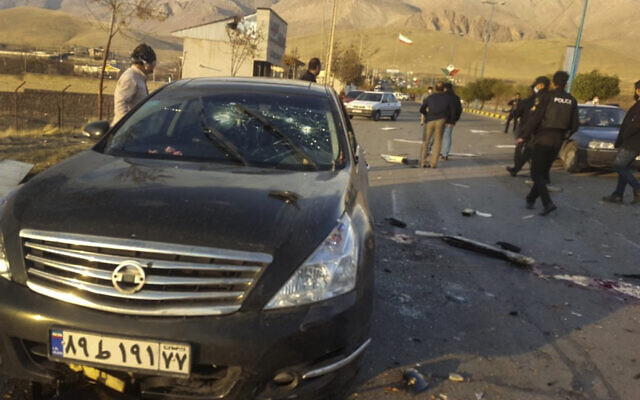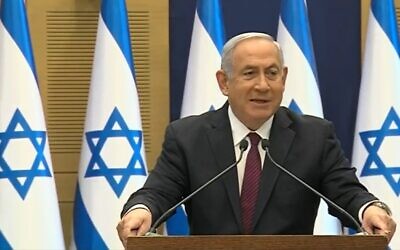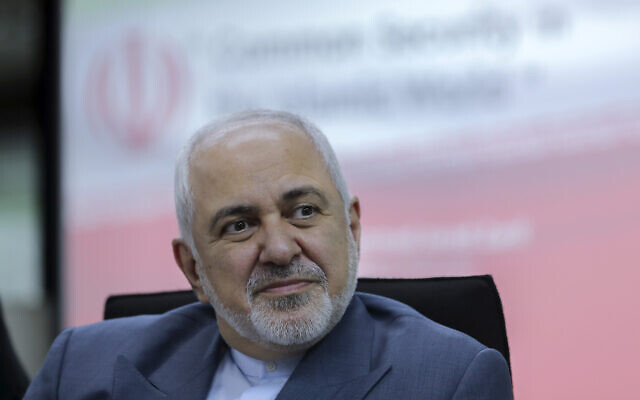In his first public comments on the assassination of Iran’s top nuclear scientist over the weekend, which Tehran has blamed on Israel, US President-elect Joe Biden said Thursday it was “hard to tell” how much it had complicated his hopes of reaching a detente with the Islamic Republic once he enters office.
In the wake of the killing, commentators have speculated it may have angered the Biden team. It has been seen as a possible move by Israel to use the final weeks of President Donald Trump’s exceedingly friendly administration to establish facts on the ground in regional geopolitics that the incoming president will be hard-pressed to overturn.
Biden has signaled he will return the US to the deal, which offered Tehran relief from international sanctions in exchange for guarantees, verified by the United Nations, that its nuclear program has no military aims.
He told The New York Times this week that if Iran returned to compliance, the US would rejoin, after which he would seek to tighten Iran’s nuclear constraints and address concerns about both its missile program and Iran’s support for militants in the region.

Dr. Mohsen Fakhrizadeh in an undated photo. (Courtesy)
Iran, meanwhile, has insisted that Washington must return to the deal without any preconditions before Tehran takes any steps to do so as well.
“The bottom line is that we can’t allow Iran to get nuclear weapons,” Biden told CNN Thursday.
He attacked Trump’s policies on Iran and his decision to quit the accord in 2018, saying the moves had failed to achieve their purpose.
“He has pulled out to get something tougher, and what have they done? They’ve increased the ability for them to have nuclear material. They’re moving closer to the ability to be able to have enough material for a nuclear weapon. And there’s the missile issues.”
He added that Washington must abandon Trump’s go-it-alone attitude toward global diplomacy, and particularly to re-engage with its European allies.
“All those things, I think, are going to be very difficult. But I know one thing: We cannot do this alone. And that’s why we have to be part of a larger group, dealing not only with Iran, but with Russia, with China and a whole range of other issues.”
The New York Times speculated Saturday that the main goal of the assassination of Fakhrizadeh, accused of being the mastermind of Iran’s project to develop nuclear weapons, was actually to impede the incoming Biden administration’s ability to reach a diplomatic solution to the conflict with Iran.

This photo released by the semi-official Fars News Agency shows the scene where Mohsen Fakhrizadeh was killed in Absard, a small city just east of the capital, Tehran, Iran, Nov. 27, 2020 (Fars News Agency via AP)
Fakhrizadeh was killed in a military-style ambush Friday on the outskirts of Tehran. The attack reportedly saw a truck bomb explode and gunmen open fire on Fakhrizadeh.
Iranian officials have pointed the finger at Israel for the killing. Jerusalem has long been suspected of taking out scientists amid tensions over Tehran’s rogue nuclear weapons program.
Fakhrizadeh was named by Prime Minister Benjamin Netanyahu in 2018 as the director of Iran’s rogue nuclear weapons project. When Netanyahu revealed then that Israel had removed from a warehouse in Tehran a vast archive of Iran’s own material detailing with its nuclear weapons program, he said: “Remember that name, Fakhrizadeh.”
The former head of the CIA under the Obama-Biden administration, John Brennan, called the assassination a crime that risked inflaming conflict in the region.
“This was a criminal act & highly reckless. It risks lethal retaliation & a new round of regional conflict,” Brennan said in a series of tweets last Friday.
Brennan noted that Fakhrizadeh was not a designated terrorist or a member of a terror group, which would have made him a legal target. In fact, however, Fakrhizadeh was an officer in the Islamic Revolutionary Guard Corps, designated by the US as a terrorist organization.
Mark Fitzpatrick, a former State Department non-proliferation official, tweeted: “The reason for assassinating Fakhrizadeh wasn’t to impede Iran’s war potential, it was to impede diplomacy.”
Amos Yadlin, the former head of Israeli military intelligence and the current head of the Institute for National Security Studies think tank, told Channel 12 over the weekend: “Whoever made this decision knows that there are 55 more days in which the White House has someone who sees the Iranian threat the way they do… Biden is a different story.”

Prime Minister Benjamin Netanyahu speaking to the press on December 2, 2020. (screen capture: Channel 12)
Netanyahu doubled down Thursday on his stance that Biden’s plan to re-enter the nuclear deal would be misguided.
“It’s a mistake to go back to the [accord]. You shouldn’t go back to that flawed agreement,” he said in a televised interview with the DC-based Hudson Institute’s Michael Doran.
Netanyahu said the deal is what gave Iran the funds to establish itself in Syria and Iraq as well as fund proxies around the region.
Meanwhile Iranian Foreign Minister Mohammad Javad Zarif said Thursday his country won’t agree to renegotiate elements of the international accord limiting its nuclear program.
“It will never be renegotiated. Period,” Zarif told a conference in Italy, speaking remotely.
He said Iran won’t agree to any curbs on its missile program or backing of regional proxies unless Western countries stop their “malign behavior” in the Middle East.
“As long as they’re not able to put up, they have to shut up,” Zarif said.
Zarif urged Biden to abandon Washington’s “rogue” behavior and lift crippling sanctions on his country, rejecting talk of renegotiating the 2015 nuclear deal.
He said that when Trump left the landmark agreement, the United States had breached a UN Security Council resolution endorsing it.

In this August 29, 2019 file photo, Iranian Foreign Minister Mohammad Javad Zarif attends a forum titled “Common Security in the Islamic World” in Kuala Lumpur, Malaysia (AP Photo/Vincent Thian, File)
“The US has been in grave breach of that resolution because the Trump administration has been a rogue regime,” Zarif said in an online interview held as part of the Mediterranean Dialogues event.
“Now if President-elect Biden wants to continue to be a rogue regime, then he can continue to be asking for negotiations to implement its commitments,” he added. “The United States must stop, the United States must cease its violations of international law. It doesn’t require any negotiations.”
The US imposed crippling sanctions on Iran after Trump unilaterally withdrew from the nuclear agreement in 2018. In response, Iran began publicly exceeding enrichment limits set by the agreement while saying it would quickly return to compliance if the United States did the same.
Rouhani, one of the architects of the 2015 nuclear agreement with world powers, favors a return to the deal and greater diplomatic engagement with the US and other Western nations.
The Link LonkDecember 04, 2020 at 02:16PM
https://www.timesofisrael.com/biden-hard-to-tell-how-much-fakhrizadeh-killing-complicates-detente-with-iran/
Biden: ‘Hard to tell’ how much Fakhrizadeh killing complicates detente with Iran - The Times of Israel
https://news.google.com/search?q=hard&hl=en-US&gl=US&ceid=US:en
No comments:
Post a Comment